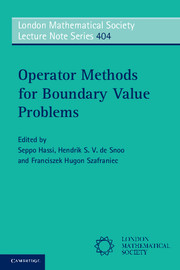Book contents
- Frontmatter
- Contents
- List of contributors
- Preface
- 1 John Williams Calkin: a short biography
- 2 On Calkin's abstract symmetric boundary conditions
- 3 Boundary triplets and maximal accretive extensions of sectorial operators
- 4 Boundary control state/signal systems and boundary triplets
- 5 Passive state/signal systems and conservative boundary relations
- 6 Elliptic operators, Dirichlet-to-Neumann maps and quasi boundary triples
- 7 Boundary triplets and Weyl functions. Recent developments
- 8 Extension theory for elliptic partial differential operators with pseudodifferential methods
- 9 Dirac structures and boundary relations
- 10 Naĭmark dilations and Naĭmark extensions in favour of moment problems
- References
1 - John Williams Calkin: a short biography
Published online by Cambridge University Press: 05 November 2012
- Frontmatter
- Contents
- List of contributors
- Preface
- 1 John Williams Calkin: a short biography
- 2 On Calkin's abstract symmetric boundary conditions
- 3 Boundary triplets and maximal accretive extensions of sectorial operators
- 4 Boundary control state/signal systems and boundary triplets
- 5 Passive state/signal systems and conservative boundary relations
- 6 Elliptic operators, Dirichlet-to-Neumann maps and quasi boundary triples
- 7 Boundary triplets and Weyl functions. Recent developments
- 8 Extension theory for elliptic partial differential operators with pseudodifferential methods
- 9 Dirac structures and boundary relations
- 10 Naĭmark dilations and Naĭmark extensions in favour of moment problems
- References
Summary
John Williams Calkin (October 11, 1909-August 5, 1964). A native of New Rochelle, N.Y., he graduated with honors in mathematics from Columbia University in 1933. He was awarded his MA in 1934 and his PhD in June 1937 by Harvard University. His PhD dissertation, Applications of the Theory of Hilbert Space to Partial Differential Equations; the Self-Adjoint Transformations in Hilbert Space Associated with a Formal Partial Differential Operator of the Second Order and Elliptic Type, was written under the direction and at the suggestion of M.H. Stone; fruitful conversations with J. von Neumann were acknowledged. In the fall of 1937 Calkin went to the Institute for Advanced Study in Princeton on a year's fellowship to work with O. Veblen and J. von Neumann. He later served as an assistant professor at the University of New Hampshire and the Illinois Institute of Technology in Chicago. During World War II Calkin was part of a mine warfare operations analysis group with J.L. Doob, J. von Neumann, and M.H. Stone. Von Neumann and Calkin worked on shock waves and damage by explosives; they were sent to England to learn of the progress under way there. When it appeared that their special knowledge would be useful for the Manhattan Project, they moved to Los Alamos. The Los Alamos Laboratory, or Project Y, had come into existence in early 1943 for a single purpose: to design and build an atomic bomb. Calkin remained there until 1946 when he accepted a Guggenheim fellowship at the California Institute of Technology.
Information
- Type
- Chapter
- Information
- Operator Methods for Boundary Value Problems , pp. 1 - 2Publisher: Cambridge University PressPrint publication year: 2012
